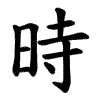時
- time, moment, season, period;
- occasion;
Etymology
A phono-semantic compound, consists of:
日 (sun) — semantic component, indicates relation to time or day;
寺 (temple) — phonetic component, supplies pronunciation "si / shí."
The original idea relates to "observing the sun to determine time."
In ancient society, time was measured primarily through the movement of the sun.
From the concept of “the sun rising and setting in a regular pattern,” the idea of “time” and “moment” developed.
Semantic development:
- seasonal timing;
- specific moment;
- hour or time unit;
- abstract time concept.
Usage in Korean
It’s used in a huge range of compounds related to time, timing, and seasons.
교시 (校時) — school period, class time
당시 (當時) — at that time, back then
시간 (時間) — time
시계 (時計) — clock, watch
시대 (時代) — era
시기 (時期) — period
동시 (同時) — simultaneous
임시 (臨時) — temporary
시륜 (時輪) — "Wheel of Time” (Buddhist term)
시세 (時勢) — the trend of the times, current situation
시한부 (時限附) — limited time, time-limited
시공간 (時空間) — time and space
Additional notes
Words that derived from 時
- 과거 시제(過去時制)–past tense
- 괘종시계(掛鐘時計)–grandfather clock
- 교시(校時)–period; class
- 단시일(短時日)–short time
- 당시(當時)–then; at that time
- 동시(同時)–simultaneousness; concurrence; coexistence
- 동시성 시대(同時性 時代)–parallel providential periods
- 모래시계(모래時計)–hourglass; sandglass
- 물시계(물時計)–water clock
- 미래 시제(未來時制)–future tense
- 벽시계(壁時計)–wall clock
- 생시(生時)–time of birth; being awake; days of one's life
- 손목시계(손목時計)–wristwatch
- 수시(隨時)–being at any time; being constant; being at one's convenience
- 수시로(隨時로)–frequently
- 시각(時刻)–time; hour; moment; minute; second
- 시간표(時間表)–schedule; timetable
- 시계(時計)–clock
- 시곗바늘(時計바늘)–clock hands
- 시공(時空)–time and space
- 시국(時局)–state of affairs
- 시대(時代)–period; time
- 시대적인 혜택(時代的 惠澤)–merit of the age
- 시사(時事)–current events; current affairs
- 시절(時節)–days; the time; season; situation of the times
- 시제(時制)–tense
- 시조(時調)–Traditional Korean three-verse poetry, which was developed from the end of the Goryeo Dynasty and and was used extensively in the Joseon Dynasty
- 암흑시대(暗黑時代)–dark age; era of darkness
- 일제 시대(日帝時代)–Japanese colonial period; Japanese colonial rule
- 적시(適時)–right time
- 전성시대(全盛時代)–prime years
- 전시(戰時)–wartime
- 전자시계(電子時計)–electronic watch
- 제시간(제時間)–schedule; time
- 초시계(秒時計)–stopwatch
- 탁상시계(卓上時計)–table clock
- 팔뚝시계(팔뚝時計)–wristwatch
- 해시계(해時計)–sundial
- 현재 시제(現在時制)–present tense
- 회중시계(懷中時計)–pocket watch
